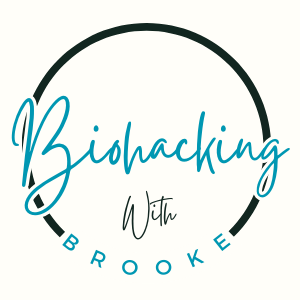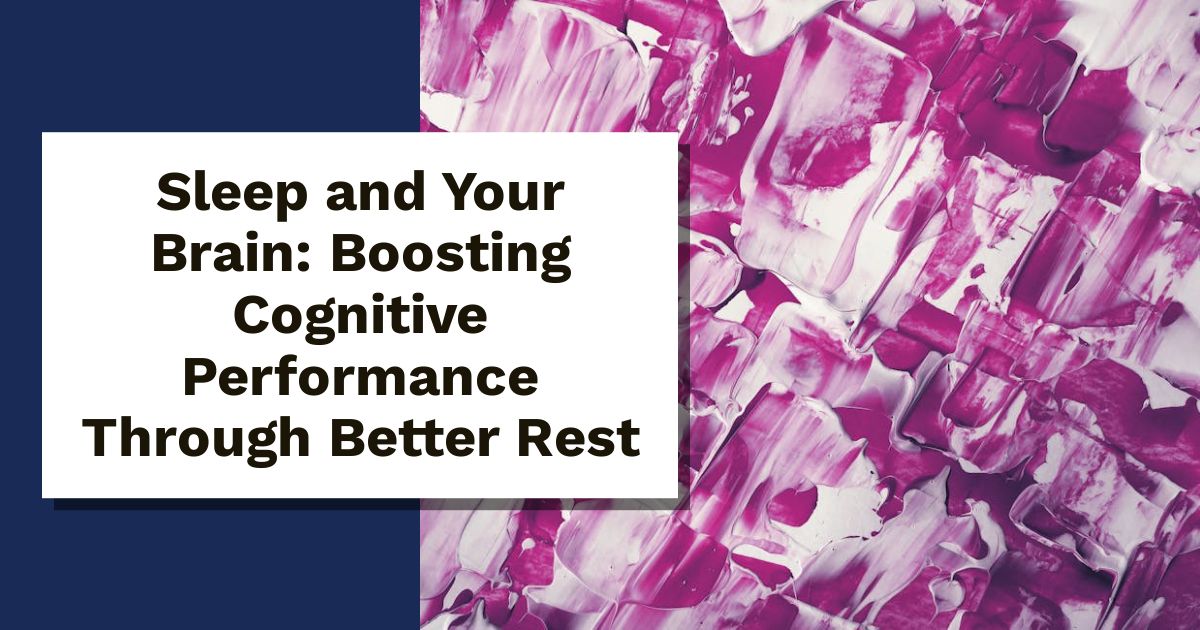Picture this: You’ve pulled an all-nighter, fueled by coffee and ambition. But how’s your brain handling it? The truth is, sleep has a huge impact on how well we think and perform. When we skimp on rest, our cognitive abilities take a hit.
In this post, we’ll unpack why quality sleep is essential for a sharper mind, better memory, and improved focus. We’ll explore the science behind sleep and its direct link to our mental performance. It’s time to discover how optimizing your sleep can supercharge your brainpower. Are you ready to unlock your full potential?
Why Sleep Matters for Your Brain
Sleep is not just a luxury; it’s a necessity for cognitive performance. Quality sleep nurtures your brain and enhances its ability to function. Let’s unpack why getting your Zzzs is crucial for brain health by examining the science of sleep, the effects of sleep deprivation, and the difference between sleep quality and quantity.
The Science of Sleep
Sleep comprises several stages, each playing a vital role in cognitive health.
- NREM Sleep: This stage consists of three distinct phases:
- Stage 1: Transition from wakefulness to sleep; it’s light and can be easily disturbed.
- Stage 2: The body enters true sleep, with a drop in heart rate and body temperature. This stage allows for memory consolidation.
- Stage 3: Known as deep sleep, it’s pivotal for physical recovery and growth, as well as memory retention.
- REM Sleep: This stage is where most dreaming occurs. It’s crucial for emotional processing and creativity. Studies show that REM sleep enhances learning and problem-solving skills.
Understanding these stages gives insight into how sleep supports optimal brain function. For more information on how sleep stages affect memory, check out Sleep Stages and Memory.
Effects of Sleep Deprivation
Lack of sleep is like running on empty. It takes a toll on brain function in several ways. Here’s what happens:
- Impaired Memory: Sleep deprivation can hinder the hippocampus’s ability to encode new memories, making it hard to learn or recall information.
- Reduced Attention: Sleep-deprived individuals often experience difficulty in focusing and sustaining attention. This leads to diminished alertness and poor decision-making.
- Emotional Instability: Insufficient sleep can affect your mood, causing irritability and increased stress levels. This can further cloud your cognitive performance.
Research indicates that chronic sleep deprivation can cause long-term neurological damage, especially in areas related to learning and memory. To learn more about these effects, explore this link to How Sleep Deprivation Can Harm the Brain.
Sleep Quality vs. Quantity
Not all sleep is created equal. Here’s a breakdown of why sleep quality holds more weight than just the number of hours spent asleep:
- Sleep Quality: It factors in how restorative sleep is. High-quality sleep allows for a complete cycle through all the stages and leaves you feeling refreshed. Disruptions can prevent this.
- Sleep Quantity: This refers to the total hours of sleep. While getting enough sleep is important, simply clocking in the hours doesn’t guarantee that your brain has fully rested.
Improving sleep quality can heighten cognitive performance. Those who prioritize good sleep hygiene often report enhanced focus and mental clarity. For a detailed look at this subject, check out Sleep Quality vs. Sleep Quantity.
By understanding the importance of sleep stages, the detrimental effects of sleep deprivation, and the difference between sleep quality and quantity, you can appreciate why sleep matters so much for your brain’s health.
Sleep and Memory
Sleep plays a crucial role in how we learn and retain information. It’s not just downtime; it’s a period of active brain processes that help solidify memories. Let’s break down how sleep specifically enhances learning and the vital contribution of REM sleep to memory retention.
How Sleep Enhances Learning
Sleep boosts your ability to learn and memorize effectively. When you learn something new, sleep is the perfect partner in that process. Think of sleep as your brain’s personal assistant, organizing and filing away all the data you’ve gathered during the day. This consolidation phase occurs mainly during deep sleep, where your brain reactivates experiences and knowledge.
Consider these key points:
- Memory Consolidation: During sleep, especially in NREM phases, your brain processes and strengthens new memories. Studies reveal that sleep supports the neural connections formed while learning, making recall easier later on. For further insights on this, check out The Impact of Sleep on Learning and Memory.
- Creative Solutions: Resting can also enhance your ability to think creatively. By allowing the brain to rest, it can take previously learned concepts and combine them in innovative ways, leading to breakthroughs in problem-solving.
- Improved Recall: A solid night of sleep can enhance your ability to remember previously learned information. This is particularly helpful for students cramming for exams. For a more in-depth discussion, see Sleep Learning: How It Works, Research, and More.
The Role of REM Sleep
Not all sleep stages are equal when it comes to memory. REM (Rapid Eye Movement) sleep plays a starring role in retaining what you’ve learned. It’s the part of your sleep cycle where brain activity spikes, resembling wakefulness.
Here’s why REM sleep matters:
- Emotional Processing: REM sleep helps your brain sort through emotional experiences, linking feelings to memories. This aids in integrating what you learn with your existing knowledge base, making it easier to understand and apply later.
- Memory Formation: Research suggests that REM sleep is responsible for forming complex memories. It strengthens connections within your brain, enhancing both procedural and declarative memory. For more on the science behind this, visit What is REM Sleep?.
- Skill Improvement: If you’ve practiced a skill or learned something new, REM sleep helps you get better at it. Your brain replays the information, fine-tuning your ability to execute it in the future. To understand its importance in depth, explore Why we need REM sleep to be healthy.
Recognizing how sleep enhances learning and the significance of REM sleep can encourage you to prioritize quality rest. So, the next time you’re tempted to cut sleep short, remember the powerful connection between sleep and memory.
Sleep Hacks for Better Cognitive Performance
Unlocking the power of sleep is essential for enhancing cognitive performance. Let’s dive into practical sleep hacks that can help you get the most out of your nightly rest.
Creating a Sleep-Friendly Environment
Your bedroom plays a pivotal role in how well you sleep. Let’s explore how to make it a sanctuary for rest:
- Control Light: Darkness signals your brain that it’s time to sleep. Use blackout curtains or a sleep mask to shut out light.
- Maintain a Cool Temperature: Aim for a cooler room—between 60 to 67 degrees Fahrenheit is ideal. A comfortable environment promotes deep sleep.
- Reduce Noise: Keep your space quiet. Consider earplugs or a white noise machine to mask disruptive sounds.
- Limit Electronics: Avoid screens at least an hour before bed. The blue light emitted can trick your brain into thinking it’s still daytime.
- Select Comforting Bedding: Invest in a good mattress and pillows that suit your sleeping style. It can make a world of difference.
For more tips on optimizing your bedroom for sleep, check out How to Make a Sleep-Friendly Bedroom and Bedroom Environment: What Elements Are Important?.
Mindful Sleep Routines
Establishing a mindful bedtime routine can help signal to your body that it’s time to wind down. Here are some strategies to try:
- Set a Schedule: Go to bed and wake up at the same time every day, even on weekends. Consistency helps regulate your body’s clock.
- Create a Wind-Down Routine: Engage in relaxing activities before bed like reading, meditating, or light stretching. This helps ease the transition into sleep.
- Limit Stimulants: Cut back on caffeine and nicotine in the hours leading up to bedtime. These can disrupt your ability to sleep.
- Practice Mindfulness: Techniques such as focused breathing or progressive muscle relaxation can calm racing thoughts and prepare your mind for sleep.
- Avoid Heavy Meals: Eating a large meal right before bed can lead to discomfort. Aim to finish eating at least a couple of hours before bedtime.
Explore more on creating a bedtime routine at How to Build a Better Bedtime Routine for Adults and The Ultimate Guide to Mindfulness for Sleep.
Using Supplements Wisely
Supplements can be helpful, but it’s important to choose wisely. Consider these options and precautions:
- Melatonin: This hormone can help regulate your sleep-wake cycle. A dose of 1 to 3 mg taken about two hours before bed is often effective. For more information, see Melatonin for Sleep: Does It Work?.
- Magnesium: Known to promote relaxation, magnesium can enhance sleep quality. Ensure you’re getting enough through food or supplements.
- Valerian Root: This herb may help you fall asleep faster. It’s generally safe, but consult with a healthcare provider if you’re taking other medications.
- Chamomile: Often consumed as tea, chamomile has mild sedative effects. It can help calm your mind after a long day.
- Cannabidiol (CBD): Some users find CBD helpful for relaxation. Like other supplements, use it with caution and consult a professional if needed.
For a more comprehensive look at natural sleep aids, check out Natural Sleep Aids: Which Are the Most Effective? and Supplementing Your Sleep – Harvard Health.
Implementing these sleep hacks can significantly improve your cognitive performance and overall well-being. Experiment with these strategies, and see which work best for you. Better sleep leads to a sharper mind and enhanced daily performance.
The Impact of Napping
Napping can be a game-changer for your brain health and cognitive performance. Understanding how to nap effectively can help you recharge your mind and body throughout the day. Let’s look at how the duration of naps influences their effectiveness and the best times to take them.
Short Naps vs. Long Naps
When it comes to napping, duration matters. Short naps, typically lasting 20 to 30 minutes, are great for a quick boost. They can improve alertness and enhance cognitive skills without leaving you feeling groggy. These power naps are perfect during a midday slump.
On the other hand, long naps can be beneficial too but should be approached with caution. Naps ranging from 60 to 90 minutes allow enough time for deeper sleep stages, which can aid in memory consolidation and emotional processing. However, be mindful: sleeping longer than this might lead to sleep inertia— that groggy feeling you experience upon waking. Think of naps as snacks for your brain; a quick pick-me-up, but don’t overindulge. For more on this, check out The Benefits of Napping and How to Make It Work for You and Napping: Do’s and don’ts for healthy adults.
Timing Your Naps
Timing can make or break a nap. The ideal window for napping is typically early to mid-afternoon, around 1 PM to 3 PM. This is when many people experience a natural dip in alertness. Taking a nap during this period can effectively counteract the afternoon slump.
Avoid napping too late in the day; hitting the snooze button after 3 PM can disrupt your nighttime sleep. Aim for those golden hours to rest and recharge. Want to know more about when to nap? Read The best time for napping: how long should naps actually … and How to Take the Perfect Nap.
Understanding the impact of napping, along with knowing how to use short and long naps strategically, can keep your brain sharp and your mood lifted. So, the next time you feel a lull, consider taking a nap; it might just provide the boost you need!
Optimize Your Sleep for a Sharper Mind
Sleep is your brain’s best friend. It’s not just about shutting your eyes; it’s about quality rest that fuels your mental engine. When we think of sleep optimization, we should consider how it can sharpen our focus, boost memory, and enhance learning. Here’s how you can make the most of your nightly rest.
The Sleep Sweet Spot
Recognizing the ideal amount of sleep is crucial. It’s not just about how many hours you log; it’s about finding that sweet spot for cognitive performance. Research shows that around 7 to 9 hours of sleep is optimal for most adults. Sleeping too little can lead to fatigue, while too much can leave you groggy. Aim for consistency. Going to bed and waking up at the same time daily can help regulate your body’s clock. For more on this balance, check out Hit the sleep ‘sweet spot’ to keep brain sharp.
Create a Sleep Sanctuary
Your bedroom should be a haven for rest. To boost sleep quality, pay attention to your environment:
- Darkness: Use blackout curtains or eye masks to block disruptive light.
- Cool Temperatures: Aim for a temperature between 60-67°F, creating an ideal sleep climate.
- Quiet Atmosphere: Drown out distractions with white noise machines or soothing sounds.
- Comfortable Bedding: Invest in comfortable pillows and a good mattress.
By crafting a sleep-friendly environment, you pave the way for deeper, more restorative sleep. Learn more about optimizing your sleeping space at Sleep Your Way to a Smarter Brain.
Mindful Evening Rituals
Establish a calming pre-sleep routine to signal your brain it’s time to wind down. This can make a significant difference in how quickly you fall asleep and how well you sleep through the night.
- Consistent Schedule: Go to bed and wake up at the same time each day. This regulates your sleep pattern.
- Soothing Activities: Engage in enjoyable pre-bedtime activities like reading, journaling, or meditating. These can help ease your mind.
- Limit Stimulants: Avoid caffeine and nicotine in the hours leading to bedtime. These can interfere with your ability to fall asleep.
Establishing these rituals can train your mind and body to relax and prepare for sleep. For more tips on creating the best bedtime routine, visit How Sleep Habits Shape Cognitive Function.
Sleep Supplements: Use with Care
Certain supplements can support your sleep journey, but choose wisely:
- Melatonin: This natural hormone can help regulate your sleep-wake cycle. A small dose before bed can ease you into sleep.
- Herbal Options: Consider valerian root or chamomile tea for their calming effects.
- Magnesium: Important for relaxation, magnesium can improve sleep quality.
Always consult a healthcare professional before trying new supplements. For more on natural sleep aids, check Sleep for Cognitive Enhancement.
By prioritizing these strategies, you can significantly enhance your cognitive performance. More quality sleep leads to sharper thoughts and a more focused mind. Embrace the power of sleep and watch your mental capabilities soar!
Brooke is a rock-climbing 🧗♀️, tennis-playing 🎾, biohacking 🧬 bookworm 📚 on a mission to unlock the secrets of health, longevity, and living life to the fullest 🌟. When she’s not scaling cliffs, hitting the courts, or testing out the latest hacks, you’ll find her nose in a book or adventuring with her four-legged best friend 🐕 by her side. With a knack for turning science into simple, actionable tips, Brooke’s writing is your guide to hacking your biology and living your best, most vibrant life!


